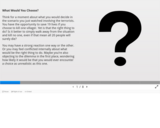
What are Moral Theories?
- Subject:
- Business and Communication
- Material Type:
- Interactive
- Provider:
- Michigan Virtual
- Date Added:
- 03/15/2022

What are Moral Theories?
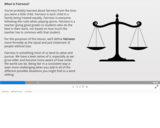
Fairness
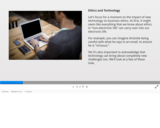
Ethics and Technology

This lesson focuses on the identification of major boundaries, borders, and barriers around the world.
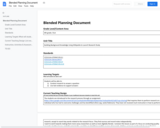
The students are introduced to the research process through an assignment (https://docs.google.com/document/d/1aV1canXyzEv0imNlA3VgYuAqXqJV4ax7xv0opIt4mtQ/edit?usp=sharing) that requires them to perform research on an individual who has had to overcome challenges and has benefitted others (eg. Jackie Robinson)
I want to work towards making them more savvy researchers as well as more digitally literate. I envision this lesson as part of a focus on conducting quality research. Another lesson, probably prior to this, would be on identifying credible sources of research. A follow-up lesson could easily be on performing effective web searches in research.
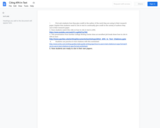
For this lesson, students will learn through a video and powerpoint presentation how to cite in-text in APA format. Students will have an opportunity to practice citing in-text before citing in their own APA research paper.
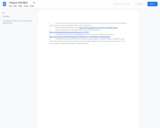
For this lesson, students will learn how to cite in-text in MLA. They will watch a video, be directed to an easy to understand web page with citation examples, and even be able to complete a worksheet on citing in-text in MLA. Once students are done with this lesson, they will be ready to cite in-text in their own research paper.
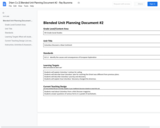
Columbus has an idea, a plan, and an amazing accident!
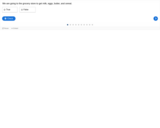
Students will choose if the sentence is using commas correctly and they will choose true or false.

Explore factors that define levels of development.
GeoInquiries are designed to be fast and easy-to-use instructional resources that incorporate advanced web mapping technology. Each 15-minute activity in a collection is intended to be presented by the instructor from a single computer/projector classroom arrangement. No installation, fees, or logins are necessary to use these materials and software.
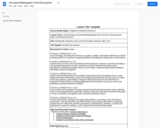
Constructing an annotated bibliography from research and using research topics as discussion starters.
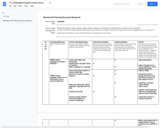
This is a short unit for grades 3-5 about how to take notes and cite sources properly for a research project.
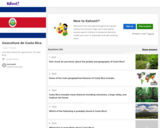
While using this object, students are introduced to new information about Costa Rica. It is reinforced with short facts and questions, and reviewed to strengthen their new knowledge of the concept. Students can access Kahoot from a computer or mobile device. As the teacher displays questions on the screen, students answer from their devices, and are given instant feedback. Percentages of each answer chosen are then displayed on the screen. As a bonus, students can later play in "Ghost Mode" to review the material and beat their score.
The object addresses the following world language standards:
2.1.M.G.a Recognize important features of country(s) where language is spoken
2.1.M.G.c Identify major geographic features (rivers, mountains, deserts, forests)
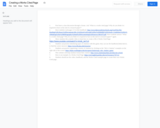
For this lesson students will learn how to create a Works Cited page in MLA. They will watch a video, play games, and read a handbook to learn the many steps and processes required in a Works Cited page.
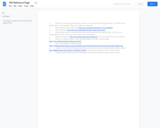
Students will learn why it is important to cite when writing. They will watch a video and look through a Prezi to learn how to cite their sources in APA. After they know the correct way to format their citations, they will work through a worksheets to identify sources that are formatted correctly. They will end the lesson by writing their own reference page for their research paper.

Students will explore how not all distances are equally distant.
GeoInquiries are designed to be fast and easy-to-use instructional resources that incorporate advanced web mapping technology. Each 15-minute activity in a collection is intended to be presented by the instructor from a single computer/projector classroom arrangement. No installation, fees, or logins are necessary to use these materials and software.

This is a writing assignment designed specifically for the special education setting. It involves having the students watch a high-interest video with teacher supported discussion. Students will use the information from the video along with three informational articles that they read. One article is provided for them. They need to find two articles on their own and read them. There are no citation requirements for this paper, however, that could easily be added.
This could easily be modified for the general education classroom adding the following Standards: RI5, RI6, RI7, W4, W7, and W8.
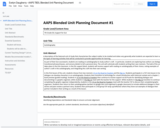
As part of their ELA coursework, students are reading an autobiography to study author's craft. In particular, students are exploring how authors use dialogue, transitional phrases/clauses, and sensory details to tell a personal story. The unit will culminate with students writing their own memoirs. The bulk of the unit takes place in the ELA classroom. In the ESL support block, students will receive support with reading an autobiography of their choice, noting examples of author's craft in the autobiography, and integrating this craft into their own writing.
In this first lesson of the unit, students choose from two memoirs 15 on the Road to Freedom and the Big Lie. Students participate in a F2F mini-lesson in how dialogue can develop characters in an autobiography. Students then transition to technology for a book introduction with historical context and a chapter 1 book preview (guided reading). Students in 15 on the Road to Freedom then continue to receive support via Ed Puzzle for identifying dialogue and documenting in a graphic organizer, while students in The Big Lie meet with the teacher for the support. While students in The Big Lie transition to continue completing the graphic organizer independently, students in the 15 on the Road to Freedom meet with the teacher F2F to discuss their completed graphic organizers. Students then return to their autobiographies (written on google docs and organized in google classroom) to include additional dialogue in their stories and peer-review a partnerÅ› story. Students then participate in a full group F2F wrap up/reflection where they share out examples of dialogue their partner included in their writing as a result of the lesson.
Online Lesson for Books: Historical Context/Chapter 1 Intro/Graphic Organizer Support
15 on the Road to Freedom: Book Introduction, Chapter 1 Preview, and Support with Graphic Organizer Task
The Big Lie: Book Introduction, Chapter 1 Preview (Note that support with graphic organizer is given F2F for this group)
Graphic Organizers
I can identify how authors use dialogue to develop characters
I can identify precise language authors use to introduce dialogue
I can identify how authors use sensory details to develop experiences
I can identify how authors use transitional words, phrases, and clauses to convey sequence shifts
Assignment Sheet
ELA Autobiography Assignment Sheet (Created by Julia Koli, Connie Ray, and Elliot Willis-Begley at Scarlett Middle School, Ann Arbor MI)
F2F Mini-Lesson #1
Mini-Lesson on Character Development Through Dialogue
Please email daughertye@aaps.k12.mi.us if you would like me to send you the additional resources I created for the remaining mini-lessons and book chapters!

Students will view this slideshow online as the first activity in a blended unit. The activity is meant to introduce the author and some of his works, including several that the students will read as part of the unit. It is primarily intended to spark student interest in the unit. However, it will also aid the students in that they will be better poristioned to read the author's works if they have some sense of what to expect in terms of themes.
The choice to include such as introductory tool into the unit was based upon prior observations regarding the difficulty of getting students engaged in any lesson when nothing had been done to sprak their interest beforehand.
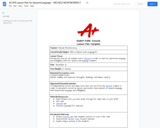
Introduction and use of multiple tools in Seesaw in order to improve expressive language and intelligibility skills for speech and language students.